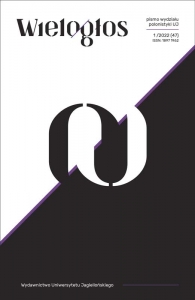Dialektyka samotności, czyli „nie o śmierć tutaj chodzi, lecz o biały kordonek”
The Dialectics of Solitude, or “Death Is Not at Stake, But the White Cord”
Contributor(s): Sebastian Brejnak (Editor)Subject(s): Polish Literature
Published by: Wydawnictwo Uniwersytetu Jagiellońskiego
Keywords: Ewa Lipska; Octavio Paz; Friedrich Nietzsche; solitude; dialectics; poetry; modern poetry; modern literature;
Summary/Abstract: The main aim of this article is to conceptualize “solitude” as one of the most relevant terms used in Ewa Lipska’s works. Brejnak claims that the experience of many of Lipska’s lyrical egos is based on longing for existential freedom and self-sufficiency (which Friedrich Nietzsche described as “the Self” in his Thus Spoke Zarathustra). This pursuit, by definition unfeasible, consists of the dialectics of creation and destruction, transgression and introspection as well as an ambiguous desire to both exceed yourself and own the awareness of yourself (which was the main problem faced by Octavio Paz in his essay The Dialectic of Solitude). Brejnak attempts to demonstrate the dialectic structure of Lipska’s “solitude” through the analysis of selected works from the poetry collection Nie o śmierć tutaj chodzi, lecz o biały kordonek [Death Is Not at Stake, But the White Cord] (1981). The main conclusion of the article is the ascertainment that “solitary” subjectivity, which Lipska problematizes in many works, can be described with the Foucauldian term homo dialecticus. It should be understood as a human being whose existence is insolvably problematic, suspended in an ontological and epistemological void – “in emergency mode.”
Journal: Wielogłos
- Issue Year: 2021
- Issue No: 50
- Page Range: 59-82
- Page Count: 24
- Language: Polish

